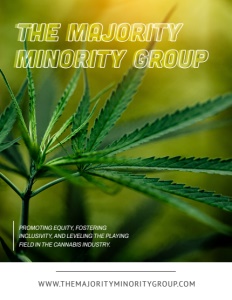The Majority Minority Group
Promoting equity, fostering inclusivity, and leveling the playing field in the cannabis industry.
Working hard for its members, the Majority Minority Group ‘grows’ the legislative and educational agenda
Established in 2019 by Ron Holmes and Kareem Kenyatta, The Majority Minority Group has a mission to bolster diversity across industries, particularly the cannabis sector. Their focus involves aiding minority candidates in securing cannabis licenses and efficiently running their enterprises.
The company’s website highlights, “While lobbying on behalf of the adult use of cannabis in Illinois, Holmes, and Kenyatta realized that cannabis legalization is more than an issue of racial and social justice for those disproportionately harmed by America’s drug war; it is also a business imperative in which people of color should and must participate.”
Kenyatta shares, “After legalization passed in Illinois, back in 2019, we founded The Majority Minority group, primarily as a diversity and inclusion company. We formed it to help people overcome the obstacles that they face. You hate to just say it’s always related to race, but it does turn out in a lot of situations that many Black and Brown entrepreneurs, not only do face obstacles as businesspeople, but they also have to get over various stigmas in the business, in the workplace and as owners.”
Advocacy and Education
For the Majority Minority Group, advocacy holds immense significance, as does education. Taking on a role that involves bridging the gap between lawmakers and entrepreneurs, the company aims to bring them together to discuss priorities.
“On the legislation side, what we find is, there seems to be an implementation problem, where we come up with these great concepts, these great policies, but then when it comes to following up and seeing how those things are going, there are people that are kind of left in between the cracks,” acknowledges Kenyatta.
“I would say, if we advocate for anything, that’s kind of what we built our foundation off of, is this concept of social equity and advocating for that.”
Kenyatta emphasizes that discussions in the cannabis industry often center on ownership, which he believes is a positive in terms of equity. He maintains that it is equally vital to consider employment opportunities, training, and diverse hiring.
“If you’re in the cannabis industry you have a real responsibility to make sure that with your workforce and in the way that you do things, you embrace this culture of diversity. Several factors tie into why this industry in particular needs to focus on diversity,” he stresses, suggesting that the cannabis industry bears a responsibility to foster diversity due to the historical context of cannabis-related arrests and convictions. The Majority Minority Group makes it a priority, particularly with legislators and advocates, to ensure that policies and developments consider diversity when shaping new laws or concepts.

Success in a Highly Regulated Industry
As a very complex and regulated industry, Kenyatta points out that the most successful cannabis operators are those who were previously involved in a highly regulated environment.
He portrays, “There are a lot of people who have been in this industry for a long time. So, when new states come on, and they bring on this concept of social equity, and they say we want new owners and we want these owners to be diverse, I think it’s important to keep in mind that we need to provide people with the training and the steps that they need to make the transition into being successful in the industry.”
One success story is Star Buds. Originally out of Colorado, Kenyata says they were looking to expand into the Illinois market.
“We explained to them the goals of Majority Minority, and they explained to us their goals and what they wanted to do. They were very interested in the concept of social equity,” he recounts.
“We were able to help them put together a very diverse team, for both the dispensary and on the craft grower side, of diverse owners that contribute to this whole concept of social equity because everyone has diverse backgrounds. They were the first majority Black-owned craft grower to get off the ground. Starbuds is a great example of a company that not only accepted this concept of diversity, but embraced it, and we’re seeing success as a result of it.”
Resources and Support
For The Majority Minority Group, supporting those who are looking to enter the Cannabis industry is done through consultation and connection to resources.
“It’s a very rigorous process even to apply to get into this industry, and unfortunately, just like any industry, there are people who take advantage of people,” Kenyatta admits.
He says the company’s primary goal is to act as a gatekeeper, pointing people in the right direction. “For example, if they do want to build a dispensary, or craft grow, we tell them what we can consult on, and direct them to other resources and people that they may want to talk to, to help build out their business.”
During the active application phase for dispensaries and craft grow in Illinois, The Majority Minority Group organized workshops to guide applicants.
“We would go through the application itself and explain each part of it, breaking down various areas, and asking people if they needed advice and trying to connect them with the right people,” describes Kenyatta.
These workshops were strategically advertised in communities that were disproportionately affected by factors like the war on drugs and poverty, to empower individuals with the knowledge and resources needed to establish themselves in the cannabis industry, whether as owners or employees.

Key Partnerships and Advocacy Efforts
The Majority Minority Group has cultivated key partnerships by collaborating with local community advocacy groups and individuals with direct experience in the cannabis industry. They’ve also established connections to gather insights on effective business practices and regulations.
Kenyatta relays, “From a business perspective, it was very important for us early on to talk to people in other states that were successful. We found a lot of people were very open to sharing their knowledge and experience, especially when we explained the concept of social equity, and how their knowledge can help Black and Brown operators be successful in the industry. I would say collaboration was a big part of how we started with the company, and how we continue to advise people today.”
Highlighting the group’s key approaches to advocacy and support within the cannabis industry, Kenyatta mentions advocating for legislation that channels funds back into impacted communities.
“The cannabis law in Illinois, the way it’s structured, there’s a certain amount of money that goes back into the community. So various community programs can get funding from the state, based on whatever they’re doing in the community. It’s a much easier, more streamlined process than your typical grant process that you get from the local or federal government,” he conveys.
Another strategy is to explore partnerships between the state, financial institutions, and other relevant entities that could be interested in providing funding and training opportunities for aspiring entrepreneurs to utilize.
“It’s more of a matchmaking kind of thing. We work on policies and laws that people can then utilize once they do become operational, or even before they become operational, to put them in the best position,” he adds.
Fighting Back through Knowledge and Skill Development
In many communities that have been impacted by the war on drugs and poverty, Kenyatta says individuals lack the experience and guidance needed for entrepreneurship and business ownership. The obstacles they face include limited access to resources, education, and prior business experience.
The complexities of setting up and maintaining a business, such as record-keeping and operations, can be overwhelming for first-time entrepreneurs. He asserts that The Majority Minority Group aims to address these challenges by offering guidance and resources that focus on providing knowledge and expertise in business operations, helping individuals understand how to effectively utilize financing and navigate the complexities of running a business.
“I think as a society, we have to kind of accept and realize that if we expect things like race not to be a factor in things like business, we need to make sure that we give people the tools and the access they need. If people have the skill set and the knowledge then we have more of a level playing field where people can compete, based on their industry and their skill set and not based on advantages or disadvantages they had based on the color of their skin,” he remarks.
In conclusion, Kenyatta underscores two main goals for The Majority Minority Group’s efforts. On a federal level, the organization prioritizes advocating for changes in the classification of cannabis as a controlled substance, noting that this shift is crucial not only for the industry’s advancement but also for granting access to essential services such as banking.
At a local level, he says the focus is on fostering communication and collaboration among Black and Brown operators in the cannabis market. By working together, they aim to enhance the industry’s operations, improve legislation, and create a stronger community of entrepreneurs in a competitive industry.
AT A GLANCE
The Majority Minority Group
What: A diversity and inclusion group with a focus on the cannabis industry.
Where: Illinois
Website: www.themajorityminoritygroup.com



